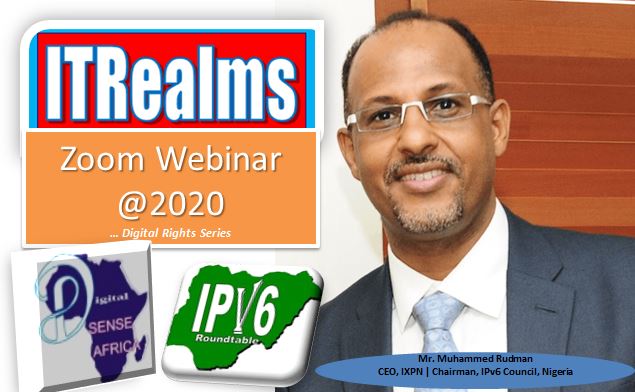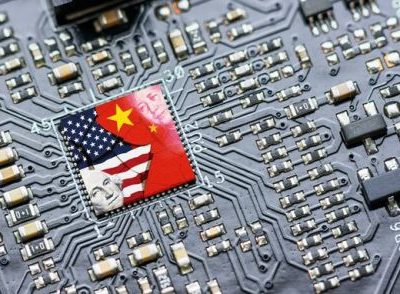With over four billion IPv4 addresses resting on the Internet and the likelihood of an Internet collapse as the need for addresses surge, IPv6 was developed to address the challenges faced by IPv4 and offers well “340 trillion, trillion, trillion addresses,” said Chief Executive Officer of the Internet Exchange Point of Nigeria (IXPN), Mr. Muhammed Rudman.\
IPv4 met the needs for addresses at inception of the Internet when connectivity to the commercial Internet was in its infancy. “No one could have predicted the impact the Internet had on our lives and it soon became clear that the pool of IPv4 addresses was not going to last as long as was hoped. This fact explains why the need for new Internet Protocol (IP) and for stakeholders to embrace the Internet Protocol version Six (IPv6)” said Rudman, who also is the chairman, IPv6 Council Nigeria/
He this insight at the 2020 Digital Rights Series webinar on Nigeria IPv6 Roundtable hosted by ITREALMS in collaboration with DigitalSENSE Africa Media at the weekend in Lagos. He spoke on the event’s theme: Role of IP in 5G v COVID-19 Debate.
Rudman, whose paper was on the “Role of IPv6 in 5G v Covid-19”, noted that every device connected to the Internet needs a unique number, known as an IP address, divided into two categories of addresses, namely the IPv4 and IPv6.
On why a new IP is needed in today’s world, Rudman said that it is only compelling for more addresses to be made available to the world as the need for addresses continue to surge.
IPv6 would help in addressing the future of global population, which is estimated to be at 9 billion by 2050.
For billions of new users, he cited that in China, and India among others, “there is about 4.7 Billion people already connected to the internet, across Personal Digital Assistants (PDAs), mobile phones, cars, appliances to name a few. In addition to over 300 million registered domains, there is need to make provision for some billions of new devices, at least for the Internet of Things.
IPv6 features, Rudman said include scalability of 340 trillion, trillion, trillion, improved security, real time application, auto-configuration, mobility, addressing and routing and extensibility to mention but a few.
On the link between IPv6 and Fifth Generation (5G) the chairman pointed out that with the Internet of Things (IoT), which is a system of interrelated computing devices, mechanical and digital machines provided with unique identifiers (UIDs) and the ability to transfer data over a network without requiring human-to-human or human-to-computer interaction, citing some instances under this object to include connected security systems, thermostats, cars, electronic appliances, lights in household and commercial environments, alarm clocks, speaker systems, vending machines and more.
Currently leading the pack in deployment of 5G, he said, is South Korea with coverage in 85 cities. China takes second place with 57 cities, followed by the United States of America (US) with 50 and the United Kingdom (UK) with 31. While the remaining countries in the top 10 for 5G are Saudi Arabia, Spain, the United Arab Emirates (UAE), Australia, Germany, and Romania.
“Nigeria, in November 2019, became the first country in West Africa to test-run 5G technology and applications, thus has not deployed 5G.
Rudman emphasised that 5G technology entails beamforming, dedicated radio signal towards the user; a 4G signal is typically spread across a wide area, which enabled by massive Multiple-Input and Multiple-Output (MIMO) technology, identifies most efficient signal path, whereas improving connection reliability, it reduces interference(unwanted signals) and boost efficient use of spectrum and power thereby allowing for allowing for more simultaneous data streams.
On the electromagnetic spectrum, Rudman said that all radiation falls into two classifications – ionising and non-ionising, as such does not have implication connected to 5G.





























